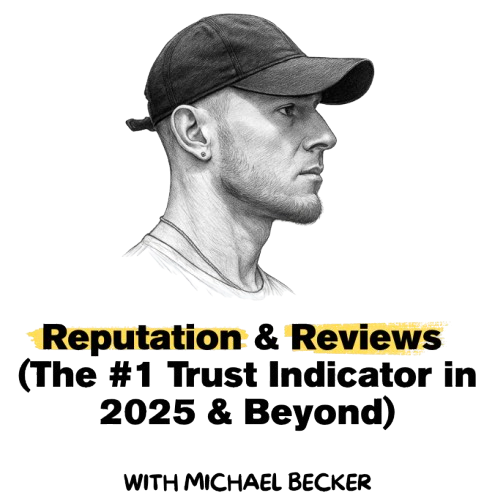Your cart is currently empty!

How to Leverage Reputation & Reviews (The #1 Trust Indicator in 2025)
When we talk about “leverage assets” in business, we usually think of things like code, content, or capital. Stuff you build once and it keeps working for you. But reputation is the one that gets missed—even though it’s arguably more powerful than all of those, especially for service businesses, retail, and local brands.

Reputation is leverage because it reduces friction.
The moment someone searches your brand or hears about you from a friend, their next move is predictable: they check for social proof. If what they find reassures them—strong reviews, consistent feedback, a recognizable presence—it smooths the path to purchase. If what they find is absent, conflicting, or underwhelming, you’ve introduced friction. They hesitate, they price-shop, or they bounce entirely.
Why reviews are becoming the #1 trust signal in a noisy marketplace
In a digital ecosystem flooded with ads, AI content, charlatan influencers, and fake news, real customer reviews are one of the last credibility indicators left. Increasingly, people don’t trust brand marketing—they trust social proof. Your reputation is quickly becoming your #1 trust signal.
Using reviews lets you extract the stored brand equity in the service your provide.
That’s the difference between leverage and labor.
With leverage: your past work (your best customer experiences, your thoughtfulness, your consistency) compounds over time, and you benefit from it without lifting a finger.
Without it: you’re re-selling every customer, re-earning every dollar, constantly in “prove it” mode.
This shows up clearly in three ways:
1. Reputation compresses sales cycles
If I’m deciding between three coffee shops I’ve never heard of, and one has 450 five-star reviews with photos of beautiful lattes and smiling baristas, my brain just made the decision for me.
That shop doesn’t have to convince me in real time. Their reputation already handled it.
Now zoom that out to any business: plumbing, fitness coaching, tattooing, SaaS/B2B, consulting. In every category, we outsource trust to what others say. If a business has built a clear, credible reputation, prospects convert faster. Sometimes they don’t even ask questions—they just buy.
That’s real-world leverage. Your past customers are doing your future selling.
2. Reputation justifies pricing power
Most people undervalue this.
If you’ve ever had to justify your rates or offer discounts just to close a sale, odds are your reputation isn’t doing enough lifting upfront.
Higher-ticket service providers and even consumer brands with price premiums don’t have to explain why they charge more. The perception of trust, quality, and social proof preempts the price question. Think of how many people buy from Apple, Whole Foods, or Louis Vuitton—not because they’re reasonably priced, but because they’re trusted.
Reputation is the frame that surrounds your pricing. It either makes people accept it or push back.
This doesn’t mean you need hundreds of five-star reviews right away—but you do need visible proof that working with you or buying from you is a safe, smart move.
3. Reputation multiplies every marketing dollar
If you’re running ads, sending emails, or doing outbound, but your online reputation is weak, you’re paying more for every conversion.
Think of reputation like conversion-rate fuel. The more trust someone has before landing on your site, the less persuasion you need to do. Your emails perform better. Your Instagram gets more saves. Your landing page hits harder.
It’s like running ads to a store that already has a line out the door—it looks legit, so people assume it must be worth checking out.
Without that baseline trust, every dollar you spend is climbing uphill.
So where does the actual leverage come in?
The work is front loaded. You build the system once—ask for reviews, highlight testimonials, respond to feedback publicly, showcase proof—and that trust engine keeps running in the background.
One solid review can sell for years. One viral testimonial video can sit on your homepage for a decade. One Google Business profile, properly maintained, can funnel free organic traffic and conversions without you ever touching it again.
It’s not sexy. It’s not “viral growth hacks.” But it’s real leverage. It’s your reputation compounding in the wild.
And here’s the other piece: it protects you.
A strong reputation can act as insulation when things go wrong. If you have 200 glowing reviews and one person has a bad experience, people will contextualize it. They’ll see the bigger picture.
But if you only have 5 reviews and one is negative? That’s 20% of your public record ruined. No insulation. No buffer. Every mistake costs you more.
Final thought
Most businesses treat reputation as a passive outcome. They hope people leave good reviews, or they “get around to it later.”
But reputation isn’t a side effect—it’s an asset.
And like any asset, it can be built deliberately, managed intelligently, and reinvested for long-term gain.
If you’re already delivering quality work, the next step is simple: turn that work into visible, durable proof. Don’t just let your reputation sit there. Put it to work.

Leave a Reply